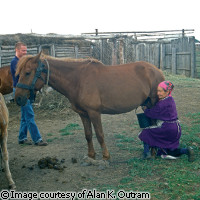Study puts horse domestication date back 1,000 years
Scientists have uncovered the earliest evidence yet of the domestication of horses. Writing in the journal Science, an international team of researchers sets out new evidence that Kazakhstan's Botai culture was breeding and harnessing horses and drinking their milk 5,500 years ago. The findings put back the date of horse domestication 1,000 years. The domestication of horses brought about a revolution in the way people travelled, communicated and fought their wars. Yet despite the importance of this event to the course of human history, pinpointing the precise time and place of horse domestication has proven difficult. There is some evidence to suggest that the Botai culture, which lived in what is now northern Kazakhstan between 5,700 and 5,100 years ago, may have domesticated horses. At that time, the steppes were prime horse habitat, and the local people hunted the region's wild horse herds extensively. Now the team of American, British, French, Kazakh and Russian scientists have come up with conclusive proof that the Botai did not just hunt horses; they bred them, milked them and harnessed them. First, the researchers compared the bones of ancient Botai horses with the bones of wild horses and Bronze Age domestic horses. The analysis revealed that the Botai's horses were closer in appearance to the Bronze Age domestic horses and to modern Mongolian domestic horses. According to the researchers, this shows that the Botai people were selecting wild horses on the basis of their physical attributes and then enhancing these traits through selective breeding. Another line of evidence comes from the horses' teeth, which bear distinctive markings that could only have come from a bit or bridle; this implies that the Botai were able to ride their horses. Finally, chemical analyses of Botai pottery revealed traces of horse milk, providing conclusive evidence that some of the mares at the site were domesticated. Furthermore, the researchers determined that the mares had been milked in summer. 'The domestication of horses is known to have had immense social and economic significance, advancing communications, transport, food production and warfare,' commented lead author Dr Alan Outram of the University of Exeter in the UK. 'Our findings indicate that horses were being domesticated about 1,000 years earlier than previously thought. This is significant because it changes our understanding of how these early societies developed.' Horses remain an important part of Kazakh life; mare's milk is still drunk there, often in the form of a fermented, slightly alcoholic beverage called koumiss.
Countries
France, Kazakhstan, Russia, United Kingdom, United States



